Scientific dialogue between the ocean and the atmosphere
By Dr. Jessica Gier, Dr. Li Li, and Dr. Esther Rickert
The Surface Ocean-Lower Atmosphere Study (SOLAS), a Global Research Project of Future Earth, held its 7th Open Science Conference from 21-25 April 2019 in Sapporo, Japan – a cosmopolitan city at the wild end of Japan. A committee of 31 people, hailing from 17 countries, came together to organize SOLAS’s hallmark science conference, which welcomed 190 attendees from 30 countries to share their research and knowledge of SOLAS science. The conference participants were treated to the arrival of the cherry blossoms in northern Japan, a truly unforgettable experience.
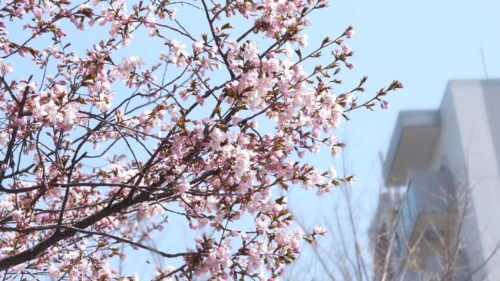
Hokkaido provided the perfect backdrop for the Open Science Conference, located at a nexus of air-sea exchange research of both global and local significance. The northern coast of Hokkaido is the lowest latitude at which sea ice forms. It also borders the Sea of Okhotsk, the primary ventilation site for the North Pacific Ocean. To the west, lies a temperate marginal sea that has been a site of extensive SOLAS research into how the human system interacts with air-sea exchange processes. And of course, to the east, the North Pacific Ocean, itself, where High Nitrate-Low Chlorophyll waters meet atmospheric dust and nutrient deposition, with periodic perturbation by typhoons.
SOLAS is an international community whose research explores the interactions between the ocean and atmosphere through physical, chemical, and biological processes at the air-sea interface. A bottom-up organisation, SOLAS has been connecting researchers around the world from across these disciplines since 2004. The SOLAS International Project Office, which is based at the GEOMAR Helmholtz Centre for Ocean Research in Kiel, Germany, with a nodal office in Xiamen, China, is responsible for coordinating the Global Research Project and was instrumental in organising the conference.
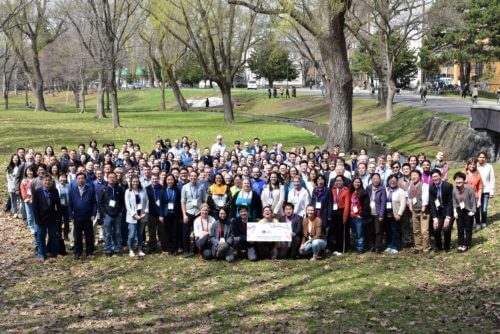
The five core themes and three cross-cutting themes outlined in the current SOLAS Science Plan 2015-2025 were covered by plenary lectures. These were complemented by discussion sessions, which provided an opportunity for our community to identify new frontiers to explore. The outcomes and reports of these sessions will be published in the SOLAS e-news and an upcoming issue of the SOLAS Event Report.
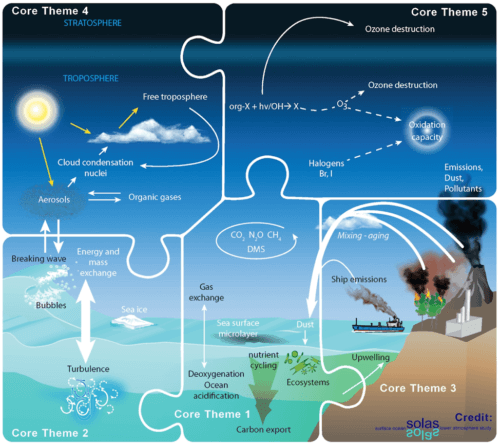
Core theme one, “Greenhouse gases and the oceans,” featured a keynote lecture from Siv Lauvset, from the Norwegian Research Centre (NORCE), Norway, on the role of humans and the ocean in the carbon cycle.
Core theme two, “Air-sea interface and fluxes of mass and energy,” was dedicated to oceanic and atmospheric processes, driven for instance by waves, bubbles or surfactants, which influence the transfer of mass and energy between the ocean and atmosphere. Daiki Nomura of the University of Hokkaido, Japan, introduced this theme with his talk on gas exchange in ice-covered oceans.
Core theme three, “Atmospheric deposition and ocean biogeochemistry,” explores the impact of particles of continental origin which enter the ocean from the atmosphere. These particles can be from natural processes, such as dust or volcanic eruptions, or human activities, such as the burning of fossil fuels and biomass or agriculture. The keynote for this session was given by Ying Chen, from Fudan University, China. Her talk focused on the impact of nitrogen and trace metals received from the atmosphere on marine phytoplankton.
Core theme four focused on the interconnections between aerosols, clouds, and marine ecosystems and how these components form a system as a whole. Jonathan Abbatt of the University of Toronto, Canada, gave the keynote talk on how the ocean, aerosols, and clouds are connected in the summertime Canadian Arctic.
Core theme five is dedicated to ocean emissions of aerosols and reactive gases and how they impact atmospheric chemistry. Anoop Mahajan, from the Indian Institute of Tropical Meteorology, India, and one of the latest additions to the SOLAS Scientific Steering Committee, introduced this theme. His talk provided a look through time at how the ocean regulates atmospheric chemistry.
In addition to the five core themes outlined above, the SOLAS Open Science Conference also dedicated sessions to their three cross-cutting themes.
The cross-cutting theme on Integrated Topics is dedicated to oceanic systems where integrated studies are required and urgent. These are regional, high sensitivity, and high-priority systems, such as for instance the upwelling systems, sea ice, and coastal waters. The keynote talk for this theme was given by Marcela Cornejo, Pontificia Universidad Católica de Valparaíso, Chile, and focused on changes in the nitrous oxide in the Humboldt Current System.
Andrew Lenton, from the Commonwealth Scientific and Industrial Research Organisation (CSIRO), Australia, introduced the cross-cutting theme on Geoengineering, which highlighted climate intervention approaches, including observational research and model predictions, as well as their environmental and societal impacts.
The cross-cutting theme on Science and Society focuses on SOLAS research with social relevance and on activities which have a direct impact on society, such as air quality, human health, ship emissions, marine resources, and climate regulation. The keynote talk by Kathryn Mengerink, from the Waitt Institute, USA, discussed the relevance of SOLAS research to marine spatial planning and science-based decision-making.
In addition to the main conference, SOLAS also organised an Early-Career Scientists Day and a Geoengineering Workshop, which were both held the day before the conference. The Early-Career Scientists Day brought together about 25 doctoral students and postdoctoral researchers to network and discuss, amongst other things, how to communicate their research to non-academic audiences. Following this, each participant presented their research in three-minute talks, with the best three talks given awards during the conference banquet. Prizes were awarded to Hannah Horowitz (University of Washington, USA), Stephanie Schneider (University of Toronto, Canada), and Pat Wongpan (Hokkaido University, Japan). The Early-Career Scientists Day ended with a field trip to Lake Shikotsu.
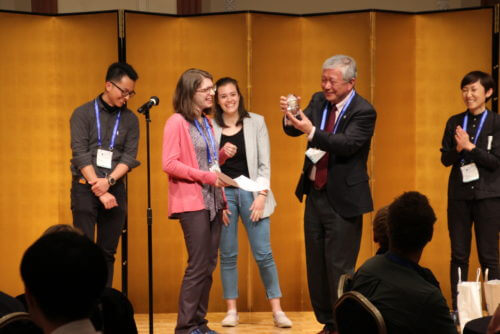
The day-long Geoengineering Workshop, led by Philip Boyd of the Institute of Marine and Antarctic Studies at the University of Tasmania, Australia, and Cliff Law of the National Institute of Water and Atmospheric Research, New Zealand, brought together observationalists, modellers, and legal experts working on the interactions between the ocean and the atmosphere. The workshop discussed how the air-sea research community can help inform the decision-making process in climate intervention. Last year, SOLAS published a Position Statement on Geoengineering, and has set itself the task of investigating the scientific basis of many carbon dioxide removal and solar radiation management techniques, such as iron fertilisation, alkalinity addition or increasing surface ocean reflectivity.
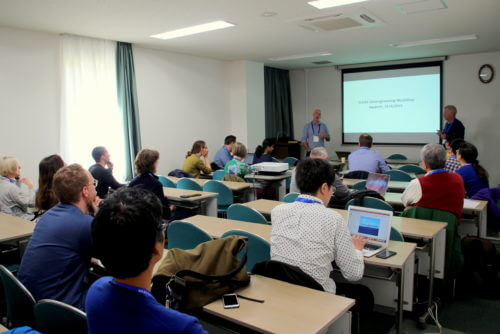
After the conference, the 17 members of the International SOLAS Scientific Steering Committee met. This three-day meeting focused on discussions of current research issues and their implementation. For example, on the subject of Science and Society, SOLAS intends to focus more intensively on how new regulations of ship emissions impact ocean biogeochemistry and how plastics at the ocean surface contribute to the release of volatile organic and greenhouse gases. In September 2019, SOLAS will support the Shipping and the Environment II conference in Gothenburg, Sweden.
The next international SOLAS Open Science Conference is scheduled for 2022.
DATE
May 23, 2019AUTHOR
Esther RickertJessica Gier
Li Li
SHARE WITH YOUR NETWORK
RELATED POSTS
Future Earth Members Join UN Ocean Conference in Barcelona
SOLAS Researchers Publish Special Feature on Air-Sea Interface in Changing Climate
Future Earth Networks Organize Workshop on Impacts of Increased Wildfires on the Ocean and Other Earth Systems